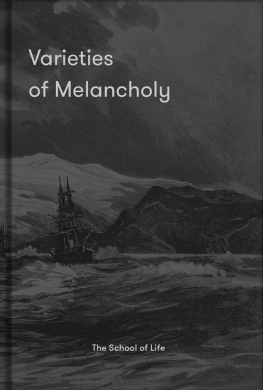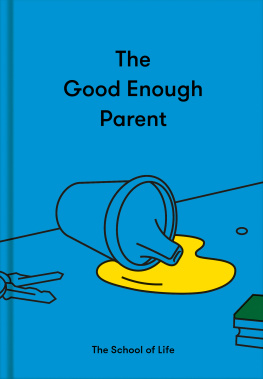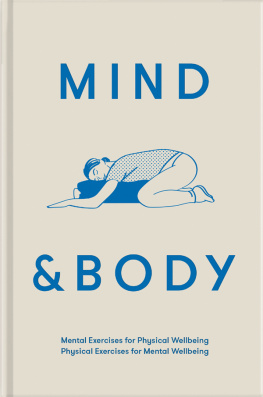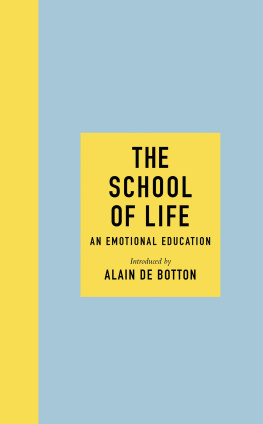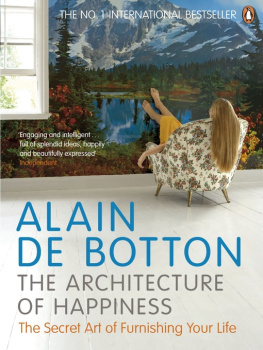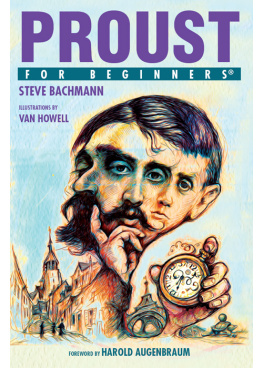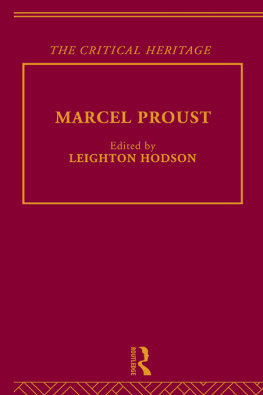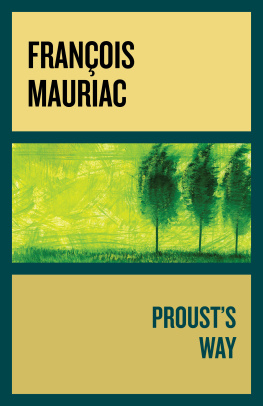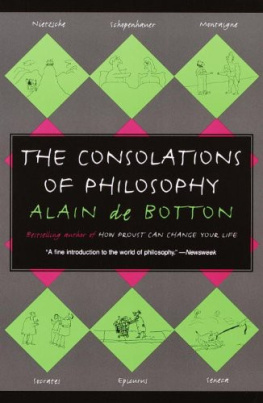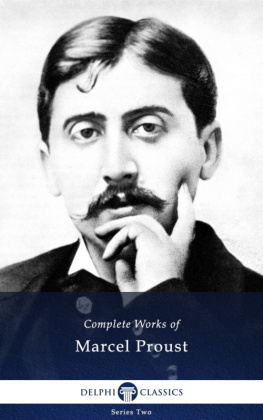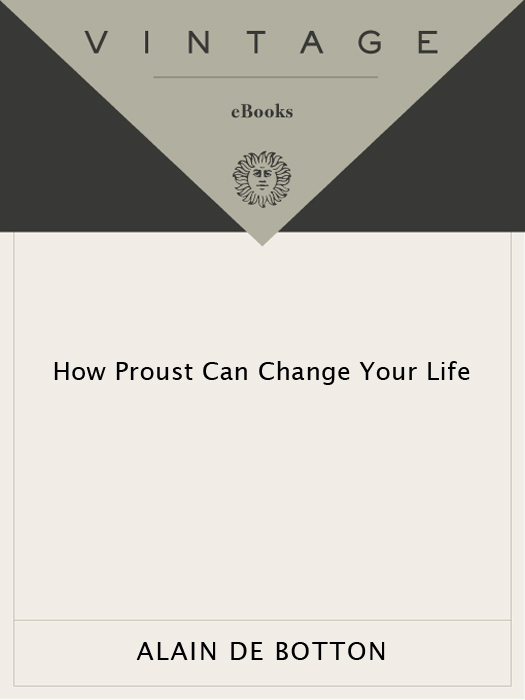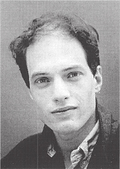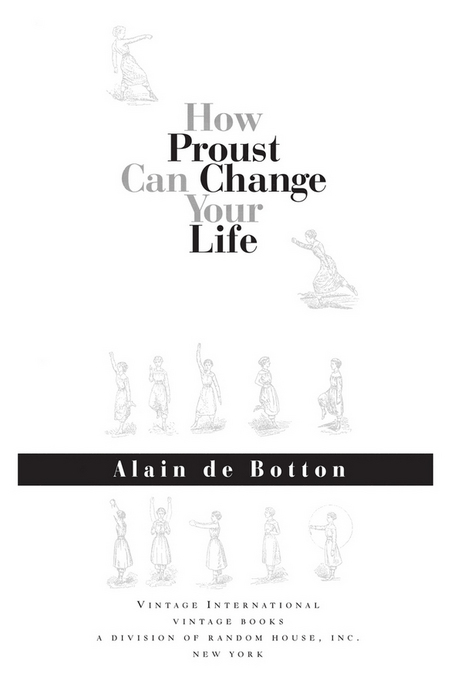Erudite. After reading de Bottons book, one will savor Proust with fresh wonder and gratitude.
A lively, original guide to living, and an engaging introduction to the life and letters of one of the centurys most interesting fictional thinkers literary criticism wearing its slyest disguise since Julian Barnes Flauberts Parrot.
Ingenious charming, erudite an amusing homage to a literary genius whose utter lack of talent for living becomes a tender inspiration.
Writing with great clarity, concision, and wit, de Botton translates the Proustian message into humbler but energetic prose.
Proust, through de Botton, offers wiser and wittier advice, and on more subjects, than any syndicated columnist.
One of my favorite books of the year. Seriously cheeky, cheekily serious.
A witty, elegant book that helps us learn what reading is for.
A wonderful meditation on aspects of Proust in the form of a self-help book. Very enjoyable.
Alain de Botton
How Proust Can Change Your Life
Alain de Botton is the author of On Love, The Romantic Movement, Kiss and Tell, The Consolations of Philosophy, and The Art of Travel. His work has been translated into twenty languages. He lives in Washington, D.C., and London. He can be reached at www.alaindebotton.com.


FIRST VINTAGE INTERNATIONAL EDITION, MAY 1998
Copyright 1997 by Alain de Botton
All rights reserved under International and Pan-American Copyright Conventions. Published in the United States by Vintage Books, a division of Random House, Inc., New York, and simultaneously in Canada by Random House of Canada Limited, Toronto. Originally published in hardcover in the United States by Pantheon Books, a division of Random House, Inc., New York, in 1997.
Photograph Acknowledgments
The Library of Congress has cataloged the Pantheon edition as follows:
De Botton, Alain.
How Proust can change your life / Alain de Botton.
p. cm.
eISBN: 978-0-307-83349-5
1. Proust, Marcel, 18711922Humor. I. Title.
PQ2631.R63Z54917 1997
843.912dc21 96-47106
Author photograph Miriam Berkley
Random House Web address: www.randomhouse.com
v3.1
Contents
There are few things humans are more dedicated to than unhappiness. Had we been placed on earth by a malign creator for the exclusive purpose of suffering, we would have good reason to congratulate ourselves on our enthusiastic response to the task. Reasons to be inconsolable abound: the frailty of our bodies, the fickleness of love, the insincerities of social life, the compromises of friendship, the deadening effects of habit. In the face of such persistent ills, we might naturally expect that no event would be awaited with greater anticipation than the moment of our own extinction.
Someone looking for a paper to read in Paris in the 1920s might have picked up a title called LIntransigeant. It had a reputation for investigative news, metropolitan gossip, comprehensive classifieds, and incisive editorials. It also had a habit of dreaming up big questions and asking French celebrities to send in their replies. What do you think would be the ideal education to give your daughter? was one. Do you have any recommendations for improving traffic congestion in Paris? was another. In the summer of 1922, the paper formulated a particularly elaborate question for its contributors:
An American scientist announces that the world will end, or at least that such a huge part of the continent will be destroyed, and in such a sudden way, that death will be the certain fate of hundreds of millions of people. If this prediction were confirmed, what do you think would be its effects on people between the time when they acquired the aforementioned certainty and the moment of cataclysm? Finally, as far as youre concerned, what would you do in this last hour?
The first celebrity to respond to the grim scenario of personal and global annihilation was a then distinguished, now forgotten man of letters named Henri Bordeaux, who suggested that it would drive the mass of the population directly into either the nearest church or the nearest bedroom, though he himself avoided the awkward choice, explaining that he would take this last opportunity to climb a mountain, so as to admire the beauty of alpine scenery and flora. Another Parisian celebrity, an accomplished actress called Berthe Bovy, proposed no recreations of her own, but shared with her readers a coy concern that men would shed all inhibitions once their actions had ceased to carry long-term consequences. This dark prognosis matched that of a famous Parisian palm reader, Madame Fraya, who judged that people would omit to spend their last hours contemplating the extraterrestrial future and would be too taken up with worldly pleasures to give much thought to readying their souls for the afterlifea suspicion confirmed when another writer, Henri Robert, blithely declared his intention to devote himself to a final game of bridge, tennis, and golf.
The last celebrity to be consulted on his pre-apocalypse plans was a reclusive, mustachioed novelist not known for his interest in golf, tennis, or bridge (though he had once tried checkers, and twice aided in the launching of a kite), a man who had spent the last fourteen years lying in a narrow bed under a pile of thinly woven woolen blankets writing an unusually long novel without an adequate bedside lamp. Since the publication of its first volume in 1913, In Search of Lost Time had been hailed as a masterpiece, a French reviewer had compared the author to Shakespeare, an Italian critic had likened him to Stendhal, and an Austrian princess had offered her hand in marriage. Though he had never esteemed himself highly (If only I could value myself more! Alas! It is impossible) and had once referred to himself as a flea and to his writing as a piece of indigestible nougat, Marcel Proust had grounds for satisfaction. Even the British Ambassador to France, a man of wide acquaintance and cautious judgment, had deemed it appropriate to bestow on him a great if not directly literary honor, describing him as the most remarkable man I have ever metbecause he keeps his overcoat on at dinner.



